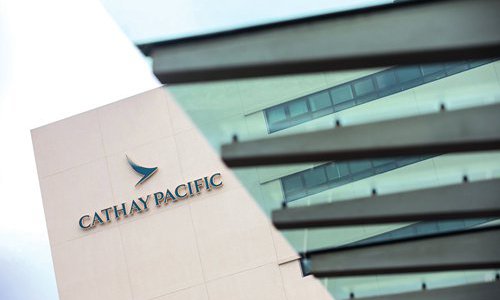HOME >> OPINION,SPECIAL-COVERAGE
Cathay Pacific must face up to safety issues
Source:Global Times Published: 2019/8/11 20:57:58

The Cathay Pacific Airways Ltd logo is displayed atop a building at Cathay Pacific City, the company's headquarters, in Hong Kong in August, 2018. Photo:VCG
After the Civil Aviation Administration of China (CAAC) issued a severe risk warning to Cathay Pacific Airways in Hong Kong, the airline said Saturday that a pilot charged with rioting had been removed from duties on July 30 and two staff members were sacked for misconduct. However, these actions can only be seen as a small step taken by Cathay Pacific in the right direction. The airline's sincerity remains to be tested by time.
Liu Chung-yin, a 30-year-old pilot with Cathay Pacific, was arrested on July 28 during a violent demonstration in Hong Kong on riot charges with 43 other protesters. Liu was later released on bail and allowed to fly out of Hong Kong. Cathay Pacific didn't condemn Liu, nor did it say how to punish him, citing privacy reasons.
After that, it is reported that some 2,000 Cathay Pacific employees including 1,200 cabin crew and pilots took part in a strike on August 5. One staff member also leaked the flight information of a group of Hong Kong police that flew to the mainland.
The airline downplayed these abominable actions, severely undermining the trust of the industry and the public. Some Cathay Pacific employees have shown extreme political inclinations and bluntly defied the rule of law. The company's safety controls have been greatly disrupted by political factors. Whether it can ensure the highest standard of flight safety and services quality in the future has become unknown.
We support the warnings and three requirements raised by CAAC to Cathay Pacific. If the airline cannot guarantee compliance with the new regulatory demands on flight safety, its flights cannot be allowed to fly to or over the mainland. It will also have to face the snub of mainland passengers.
We hope Cathay Pacific will stick to professionalism, making it its lifeline to expand the mainland market. It should make arduous efforts to prevent radical political sentiments spreading within the company. It shouldn't condone some employees' hostility against the "one country, two systems" principle or allow crew members who are obsessed with radical politics, or have violence on record, to take charge of the safety of flights to the mainland.
Cathay Pacific has dealt with three of its employees, but only under CAAC pressure. It is not guaranteed that Cathay Pacific will really operate in the correct direction in the future.
To push some institutions in Hong Kong to maintain professionalism, many Chinese mainland people believe it is necessary for the mainland to pressure them using various levers. Some proposed the mainland impose high fines on companies that violate business rules and the moral bottom line.
The US and Europe have been keeping a tough stance in this field. China shouldn't hesitate when necessary. We still need to learn more in this aspect.
The Chinese mainland should act in accordance with the Basic Law to deter the Hong Kong forces that oppose "one country, two systems" principle and violate the rule of law as well as damage the interests of people on the mainland.
To act according to various norms is Cathay Pacific's obligation. It is hoped that the airline could make constructive efforts to regain the trust of mainland people. If Cathay Pacific continues sacrificing aviation safety and high-quality services for political passion within the company, it then chooses to undertake the price of great losses on the mainland market.
Posted in: EDITORIAL,OPINIONS